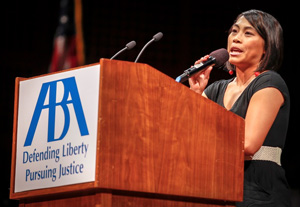Human trafficking must end, says Justice Kennedy at ABA's Opening Assembly

Minh Dang speaks at the Opening Assembly.
Photo by Tony Avelar.
It’s not easy to upstage a U.S. Supreme Court justice in an auditorium full of lawyers, but an assertive young woman with a compelling story to tell almost pulled it off Saturday evening at the Opening Assembly of the ABA’s 2013 Annual Meeting in San Francisco.
Justice Anthony M. Kennedy was the keynote speaker for the Opening Assembly, a role he has filled a few times at past annual meetings. But last night, he had the task of following Minh Dang, who recounted her experiences as a victim of human slavery in the United States, and her efforts to deal with her personal trauma while advocating for other victims of human trafficking.
Outgoing ABA President Laurel G. Bellows has hammered away at the problem of human trafficking throughout her one-year term, which will end on Tuesday at the close of the Annual Meeting. At the start of her term, Bellows, who is the principal of the Bellows Law Group in Chicago, created a Task Force on Human Trafficking. The task force will continue its work during the term of incoming ABA President James R. Silkenat, a partner at Sullivan & Worcester in New York City, and probably beyond, as well.
And the agenda for the House of Delegates this week includes a proposed uniform state law covering human trafficking. The measure was drafted by the National Conference of Commissioners on Uniform State Laws. The House will meet all day on Monday and part of Tuesday.
Bellows told the Opening Assembly audience that the ABA also has developed a training program for first responders to help them identify human trafficking cases and assist victims more effectively, and has drafted uniform business conduct standards relating to trafficking.
But it took Minh Dang to put a human face on the issue as she gave a painful account of being sold as a sex slave in the San Francisco area by her own parents. She has been a tireless advocate for vulnerable children and other trafficking victims around the world, and until recently she served as executive director for Don’t Sell Bodies, an initiative founded by actress Jada Pinkett Smith. In May, Dang was recognized as a White House Champion of Change.
Dang acknowledged, however, that dealing with her own demons has been difficult. “I struggle every day just to wake up, to get out of bed,” she said. About seven years ago, she finally began to tell the story of how her father raped her and how both parents would deliver her to Bay Area brothels.
“I need to speak over and over and over about how my parents mistreated me,” Dang told a rapt audience at the Louise M. Davies Symphony Hall, which normally is filled with the strains of music performed by the San Francisco Symphony. “I am a 29-year-old woman learning to love myself again.”
For his part, Justice Kennedy noted estimates by the U.S. State Department that there are some 27 million people being held in captivity as slaves around the world. At least 100,000 of them are in the United States. Kennedy said that perhaps 0.5 percent of those people will be freed this year.
“Let’s stop human trafficking,” Kennedy said. “I urge you to continue to bring this to the world’s attention.”
In a brief speech in which Kennedy urged the ABA to work to make legal education an attractive option for young people and to assert the importance of the “language of the law,” he put special emphasis on the need to continue teaching civics as a way of assuring that Americans fully appreciate the concept of freedom.
“The verdict on freedom is still not certain in most parts of the world,” said Kennedy. “The jury is still out, and they’re looking to us to make the case.”



